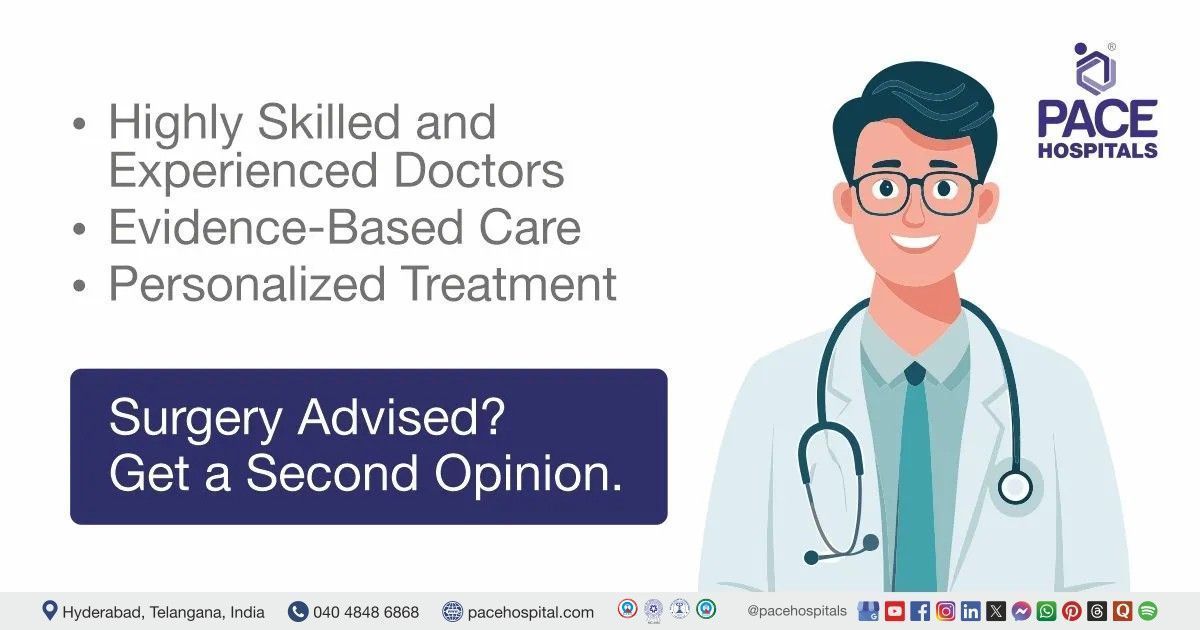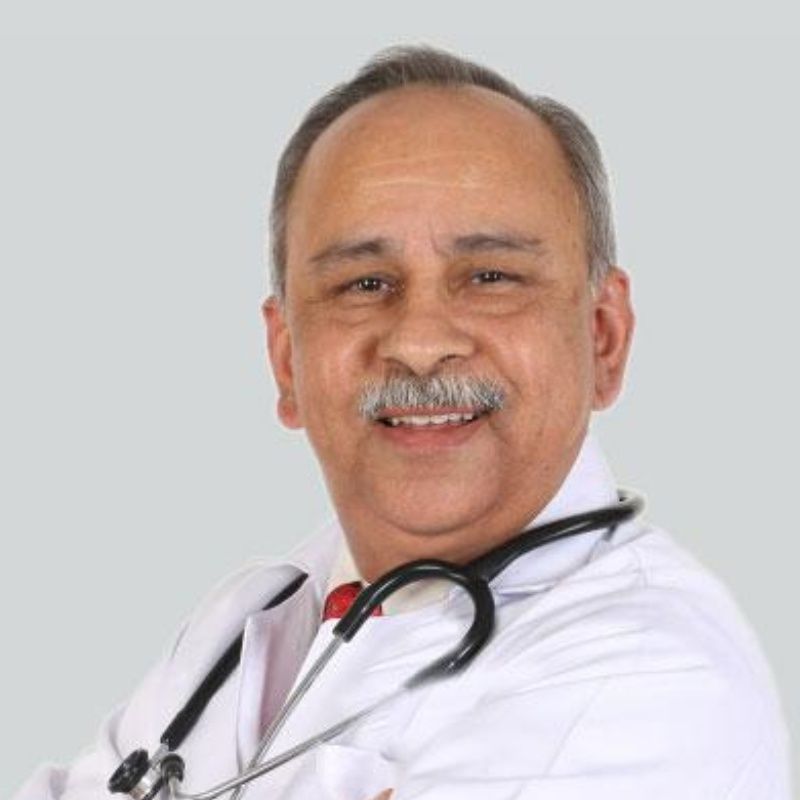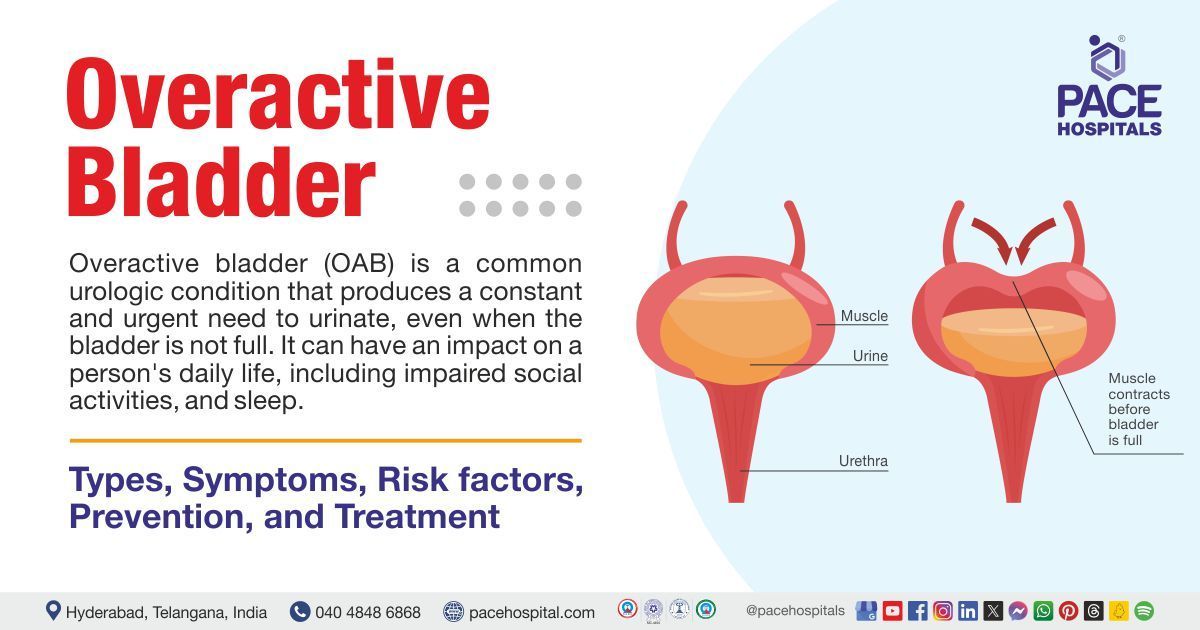Best Overactive Bladder Specialist in Hyderabad for Accurate Diagnosis & Advanced Treatment
PACE Hospitals
✅ Recommended by 9,452 Happy Patients. Get hassle-free appointments with Overactive Bladder Doctors.
Dr. Abhik Debnath
MBBS, MS (General Surgery - IMS, BHU), MCh (Urology - CMC Vellore), DNB (Urology)
Experience : 12+ years
Consultant Laparoscopic Urologist, Endourologist, Andrologist & Kidney Transplant Surgeon
Specialist
Specialist in Urological conditions - Kidney stones, Bladder stones, Ureteral stones, Urinary tract infections, Pelviureteric junction obstruction, Chronic kidney disease, Bladder infections, Enlarged prostate, Hydrocele, Overactive Bladder, Interstitial Cystitis, Haematuria, Sexually transmitted infections, Paediatric urological conditions (undescended testicles and bedwetting), Urethral stricture, Urofacial syndrome, Bladder exstrophy, Hydronephrosis, Cancer conditions (bladder cancer, kidney tumour, testicular cancer and prostate cancer), etc.
Expertise
Minimally invasive procedures (endoscopic, laser, laparoscopic and robotic) that includes Renal transplantation and AV fistula creation, Double J stenting, Ureteroscopic lithotripsy (URL), Retrograde intrarenal surgery (RIRS), Percutaneous nephrolithotomy (PCNL), Percutaneous cystolithotomy (PCCL), Cystolitholapaxy, Transurethral resection of the prostate (TURP), Holmium laser prostate surgery (HoLEP), Transurethral resection of bladder tumour (TURBT), Direct vision internal urethrotomy (DVIU), urethroplasty, perineal urethrostomy, etc. In addition, he has special interests in diagnosing and treating overactive or underactive bladder, neurogenic bladder, voiding dysfunction, urological cancers, and urological stones.
Consultation Details
Languages Spoken: English, Hindi, Bengali, Telugu
Timing: Mon to Sat - 9 AM to 6 PM
Location: PACE Hospitals, HITEC City
Dr. K Ravichandra
MBBS, MS (General Surgery), MCh (Urology)
Experience : 11+ years
Consultant Laparoscopic Urologist, Andrologist & Kidney Transplant Surgeon
Specialist
Specialist in Urinary tract infections, Kidney stones, Pelviureteric junction obstruction, Bladder stones, Ureteral stones, Bladder infections, Chronic kidney disease, Enlarged prostate, Overactive Bladder, Hydrocele, Interstitial Cystitis, Sexually transmitted infections, Haematuria, Urethral stricture, Bladder exstrophy, Hydronephrosis, Cancer conditions (bladder cancer, kidney tumour, testicular cancer and prostate cancer), etc.
Expertise
Ureteroscopic Lithoripsy (URSL), Retrograde Intrarenal Surgery (RIRS), Double-J stenting, Percutaneous Nephrolithotomy(PCNL), Percutaneous Cystolithotomy, Cystolitholapaxy, Transurethral Resection of Prostate(TURP), Nephrectomy, Direct Visual Internal Urethrotomy etc.
Consultation Details
Languages Spoken: English, Hindi, Telugu
Timing: Mon to Sat - 9 AM to 6 PM
Location: PACE Hospitals, HITEC City
Dr. Vishwambhar Nath
MBBS, MS (General Surgery), DNB (Urology), M.Ch (Urology)
Experience : 40+ years
Senior Consultant Urologist & Renal Transplant Surgeon
Specialist
Specialist in Minimally Invasive treatments for Kidney Stones, BPH and Bladder Dysfunction, and Urological Cancers with a special interest in Bladder Cancer, Kidney Transplantation, and Laparoscopic and Robotic Urology.
Expertise
Medical and Surgical Treatment for BPH and Bladder Dysfunction, Urological Cancers, Reconstructive and tropical Urology, Minimally Invasive treatments for Kidney Stones, Kidney Transplantation, Evidence-Based Medicine, and Bringing the Art Back Into the Science of Medicine.
Consultation Details
Languages Spoken: English, Hindi
Timing: Mon, Wed, Fri - 11 AM to 1 PM
Location: PACE Hospitals, HITEC City
Top Overactive Bladder Doctors in Hyderabad for Bladder Health and OAB Management
PACE Hospitals is recognised for having some of the Top overactive bladder doctors in Hyderabad, India, known for their expertise in diagnosing and managing urinary urgency, frequency, nocturia, and urge incontinence. Our experienced overactive bladder specialists deliver personalised, patient-centric care focused on precise evaluation, counselling, and step-by-step guidance. Our team ensures timely access to specialist consultations and coordinated follow-up.
Equipped with advanced diagnostic tools, including bladder diaries, urinalysis, ultrasound, uroflowmetry, post-void residual assessment, and comprehensive urodynamics (with cystoscopy when indicated), we provide a precise evaluation to identify contributing factors such as detrusor overactivity, pelvic floor dysfunction, infection, stones, medication effects, or neurological causes. If you are seeking a doctor for overactive bladder, our specialists will guide you through a thorough assessment and a tailored plan from the outset.
Our
overactive bladder specialist doctors offer a broad spectrum of
overactive bladder treatment options, including lifestyle optimisation, bladder training, and pelvic floor physiotherapy, as well as pharmacotherapy. With a strong commitment to clinical excellence, compassionate care, and long-term bladder health, PACE Hospitals is a trusted destination for people seeking sustained relief and better daily function, led by the
best overactive bladder specialist in Hyderabad, India.
Frequently Asked Questions (FAQs) on Overactive Bladder
What is an overactive bladder (OAB)?
Overactive bladder (OAB) is a condition where a person feels a sudden, strong need to urinate frequently during the day and night, even if the bladder is not full. Sometimes this leads to accidental urine leakage (incontinence). It happens due to involuntary contractions of the bladder muscles that cause urgency and frequent bathroom trips. OAB can affect daily life and sleep quality significantly. For authoritative guidance on OAB, consult an overactive bladder specialist.
What causes overactive bladder?
Overactive bladder can be caused by several factors. The most common reason is abnormal signals from the nerves to the bladder muscles, causing the bladder to contract too often or at the wrong times. Other causes can include urinary tract infections, certain medications, nerve disorders, or conditions like diabetes. Sometimes, no specific cause is found. Age, obesity, and previous pelvic surgery can also increase the risk of developing OAB. For a cause focused review, meet an experienced overactive bladder doctor.
Can overactive bladder be cured?
Overactive bladder cannot always be completely cured, but its symptoms can often be managed or greatly improved. Many people find relief through lifestyle changes, bladder training, pelvic floor exercises, and medications. In some cases, further treatments such as nerve stimulation or surgery may be considered. While a permanent cure is not always possible, appropriate therapy can help most patients gain more control and improve their quality of life. A personalised plan from the best doctors for overactive bladder treatment can enhance day to day control.
What’s the difference between overactive bladder and incontinence?
Overactive bladder refers to a group of symptoms, mainly a sudden, strong urge to urinate that is hard to control, and often needing to urinate frequently, including at night. Incontinence means the actual loss of bladder control, leading to accidental leakage of urine. While overactive bladder can cause urge incontinence, not everyone with overactive bladder leaks urine. Incontinence can also have other causes, such as weak pelvic muscles or certain medical conditions. For accurate diagnosis and treatment, consult the best overactive bladder specialist in Hyderabad, India.
What are the best treatments for overactive bladder?
The best treatments for overactive bladder usually start with lifestyle changes, such as bladder training, scheduled bathroom visits, and pelvic floor exercises (like Kegels). If these are not enough, medications that relax the bladder muscles may be prescribed. For people who do not respond to these treatments, options like nerve stimulation or surgery may be considered. Treatment is tailored to symptom severity and response to earlier steps. For stepwise care, consult the best doctor for overactive bladder in Hyderabad, India at PACE Hospitals.
Which doctor should I consult for overactive bladder?
A patient with an overactive bladder should consult a urologist, a specialist in urinary tract disorders. Women might also see urogynecologists, who focus on female pelvic floor conditions. Primary care physicians can also start evaluation and refer patients to specialists. A multidisciplinary approach may be required for thorough management. For coordinated care, many patients choose experienced overactive bladder specialists in Hyderabad, India at PACE Hospitals.
What foods should I avoid with overactive bladder?
Certain foods and drinks may irritate the bladder and worsen overactive bladder symptoms. Common triggers include caffeine (coffee, tea), alcohol, carbonated drinks, spicy foods, citrus fruits, and artificial sweeteners. These can increase urgency and frequency. Keeping a urination diary can help identify personal triggers. Staying hydrated with plain water and maintaining a healthy, balanced diet is also recommended. Discuss trigger management with a good overactive bladder specialist.
Can overactive bladder be a sign of prostate problems?
Yes, OAB can sometimes be a sign of prostate problems, especially in men as they age. The prostate gland, when enlarged, can press against the urethra and affect how the bladder empties. This can lead to symptoms like frequent and urgent urination. However, overactive bladder can occur without prostate problems; thus, a medical evaluation is required to determine the exact cause. If you have these symptoms, overactive bladder doctors can evaluate prostate related factors.
What are the side effects of overactive bladder medications?
Medications for overactive bladder, such as antimuscarinics and beta-3 agonists, can cause side effects including dry mouth, constipation, blurred vision, dizziness, and sometimes headache. Antimuscarinics may also cause difficulty urinating or increased heart rate. Beta-3 agonists can raise blood pressure in some cases. Side effects vary depending on the medication and individual, so doctors carefully balance benefits and risks. Discuss benefits and risks with a doctor for overactive bladder to choose the right medicine.
Is overactive bladder related to aging?
Overactive bladder is more common as people get older, but it is not considered a normal part of aging. Changes in the bladder muscles and nerves, as well as other health conditions that become more common with age, can increase the risk. While aging can make overactive bladder symptoms more likely, younger people can also experience this condition. For age specific strategies, consult with an overactive bladder specialist.
How to train the bladder using scheduled voiding?
Scheduled voiding is a bladder training technique where a person urinates at set times during the day, gradually extending the time between bathroom visits. This helps to retrain the bladder to store more urine while reducing urgency. Over time, this can improve control and reduce the frequency of symptoms. An overactive bladder specialist doctors can personalise a schedule and track progress with you.
Is overactive bladder a sign of something serious?
Overactive bladder is not usually a sign of a serious illness, but it can greatly affect daily life. In most cases, OAB occurs without a clear underlying disease. However, it is important to rule out urinary infections, bladder stones, and neurological diseases. If symptoms appear suddenly or worsen quickly, a medical evaluation is recommended to rule out any other potential causes that require attention. If you are concerned, a trusted overactive bladder specialist can help rule out serious causes.
How common is overactive bladder?
Overactive bladder is quite common, affecting about 16-20% of adults over the age of 40 worldwide. It is more frequent in women than men and its prevalence increases with age. Many people experience symptoms like frequent urination, urgency, and nocturia (frequent night time urination), which can impact daily activities and sleep patterns. For personalised guidance, meet the famous overactive bladder doctors in hyderabad, india.
How long does overactive bladder last?
Overactive bladder can be a long-lasting (chronic) condition for many people, but the duration varies. Some people may have symptoms for only a short time, especially if caused by a temporary issue like a urinary tract infection. For others, symptoms may persist for months or years and require ongoing management. Treatment and lifestyle changes can help reduce symptoms and improve quality of life, but the condition may not go away completely. Regular follow up with overactive bladder specialist doctors supports long term control.
Can stress or anxiety cause overactive bladder?
Stress and anxiety do not directly cause overactive bladder but can worsen its symptoms. Emotional stress may increase urgency and frequency due to the effects of the nervous system on bladder function. Managing stress and anxiety can help reduce symptom flare-ups, especially when combined with medical OAB treatments. Combining stress care with an overactive bladder treatment specialist may reduce symptom flares.
Can smoking affect OAB symptoms?
Smoking can worsen OAB symptoms. It irritates the bladder lining and can increase bladder inflammation, leading to more frequent urination and urgency. Chronic coughing from smoking can weaken pelvic floor muscles. This increases the risk of urine leakage. It's often advised to quit smoking to help reduce OAB symptoms and improve bladder health overall. For quitting support and bladder care, meet an experienced overactive bladder treatment doctor.
Can OAB be mistaken for bladder infection or other conditions?
Yes, symptoms of OAB, like frequent urination, urgency, and nocturia, may be mistaken for bladder infections, urinary tract infections (UTIs), bladder stones, or tumours. These other conditions can cause similar symptoms but usually come with pain or burning during urination, which is not common in OAB. A medical evaluation helps identify whether someone has OAB or another issue. When symptoms overlap, the best overactive bladder doctors in hyderabad, india can perform focused tests to confirm the cause.
How is overactive bladder diagnosed?
OAB diagnosis involves a medical history review focused on symptoms like urgency, frequency, and leakage. Doctors may ask patients to keep an urination diary. Tests include urine analysis to rule out infection, post-void residual measurement to check urine left in the bladder, and urodynamic studies to assess bladder function. Diagnosis is mainly clinical, based on symptom patterns combined with test results. For comprehensive testing, book an appointment with top overactive bladder specialist at PACE Hospitals in Hyderabad, India.
Is overactive bladder painful?
Overactive bladder usually is not painful. It typically causes urgency, frequent urination, and sometimes leakage. Pain is not a common symptom and may suggest another problem, such as a urinary tract infection or bladder inflammation. If pain is present, especially during urination or in the lower abdomen, a medical evaluation is necessary to rule out other bladder or pelvic conditions. For pain evaluation and symptom review, consult an experienced overactive bladder doctors.
Can OAB go away on its own?
Overactive bladder (OAB) usually does not go away on its own, as it is often linked to persistent nerve or muscle problems. While mild symptoms may come and go, most cases require treatment to improve bladder control. Lifestyle changes, bladder training, or medications are typically needed. Without proper management, symptoms may worsen and affect daily life. For sustained improvement, partner with the best doctors for overactive bladder treatment through a stepwise plan.
What our patients have to say
Why choose PACE Hospitals?
- A Multi-Super Speciality Hospital.
- NABH, NABL, NBE & NABH - Nursing Excellence accreditation.
- State-of-the-art Liver and Kidney transplant centre.
- Empanelled with all TPAs for smooth cashless benefits.
- Centralized HIMS (Hospital Information System).
- Computerized health records available via website.
- Minimum waiting time for Inpatient and Outpatient.
- Round-the-clock guidance from highly qualified super specialist doctors, surgeons and physicians.
- Standardization of ethical medical care.
- 24X7 Outpatient & Inpatient Pharmacy Services.
- State-of-the-art operation theaters.
- Intensive Care Units (Surgical and Medical) with ISO-9001 accreditation.
Share on
Request an appointment
Fill in the appointment form or call us instantly to book a confirmed appointment with our super specialist at 04048486868
Appointment request - health articles
Recent Articles















